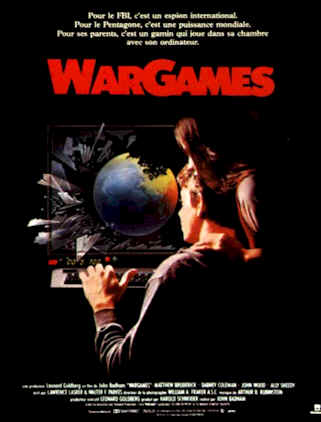
WAR GAMES
US, 1982, 113 minutes, Colour.
Matthew Broderick, Dabney Coleman, John Wood, Ally Sheedy, Barry Corbin.
Directed by John Badham.
War Games was one of the popular box office successes in the United States in 1983. It preceded the serious films on nuclear issues: Silk-wood, The Day After, Testament. This film is definitely geared to a teenage audience - but adults will enjoy the film as well. While its focus, like Dr. Strangelove and Fail Safe, is on nuclear war games and their grim reality, the style of the film is Boys' Own adventure (this time the boy being a computer whiz kid) and is designed as a computer video game. This sets the tone for the film and its style (with all its apparent technological realism).
Matthew Broderick (Max Dugan Returns) is engaging as the hero. Dabney Coleman is effective as Mc Kittrick, the computer expert. Direction is by John Badham (many telemovies, Saturday Night Fever, Dracula, Whose Life Is It Anyway) who made this film with the helicopter police thriller Blue Thunder.
As a popular contribution to nuclear warfare awareness, the film is effective and entertaining, getting through to its younger audience. The screenplay by Lawrence Lasker and Walter F. Parkes was nominated for Oscar for Best Original Screenplay.
1. The anti-nuclear films of 1983-84? The concern about nuclear issues in the '80s? This film as part of the trend? The quality of its contribution? Oscar-nominated screenplay? Box office success? Impact for younger audiences?
2. The title and the traditional use of the term? The irony of the phrase 'war games'? From games to reality? The background of computers and video games? Fantasy and reality? The skills required for war games, mind-sets, strategies? The exercise of power? Har games echoing the real world?
3. The United States and its international policies in the '80s? The background of bomb development and bomb deployment? The film's use of special effects, technology? Human control of the technology - or vice versa? Who teaches whom? Hho learns? Who is corrected? The irony of technology and war games - the protagonists getting so involved in the games that they want (consciously or unconsciously) it all to happen in reality?
4. The authenticity of the film's background: America in the '80s, towns, schools, the Cheyenne headquarters, the scientists' retreat? The different aspects of the contemporary world? Ordinary life coexisting with high-powered technology?
5. The clear message of the film: for the '80s, about war, nuclear issues, American- Soviet relationships? The youth focus - the message for the youthful audience? Contribution to politics, technology, nuclear issues? A future for youth?
6. The prologue and nuclear questions, decisions, obedience? Challenge? The prologue setting the tone for what follows?
7. The transition to David: ordinary American schoolboy, clever, life at school, family background, friends? Seeing him rig the computer for better grades? Youthful audiences identifying with him and his friends?
8. David as a character: whiz-kid, his skill and cleverness, the bond with Jenny? How well delineated? Seeing him use his skills? The telephone calls? Evading the pursuit? Learning Falken's games? Using his brains to enter the computer system? His playing war games - and his excitement? The ironic parallel with the Pentagon theoretical excitement of the war games? David learning of the truth from the television? Television and communications? Phone communications? The chase, the arrest? Being taken to headquarters, the interrogation, Mc Kittrick's suspicions? The repercussions and the growing seriousness?
9. The background of Cheyenne and the headquarters? Technology, the plant? The way in which it was photographed - with a love for technology? The maps, the trajectories? The method of control of the computer? The personnel? Security, the serious issues and the human handling of them? The Washington authorities and the crisis?
10. The dilemma about growing computers? The humorous anagram HOPR? Falken and his work, experimentation, teaching his computer, its capacity for learning, its having a mind of its own - yet being able to be corrected? Its breaking through the need for correction? The name of the computer, Joshua and the personification of computer power?
11. The growing danger, the reality of missiles and bombs? How well did the film communicate suspense? Decisions about the counterattack to the Russians? Deadly war games?
12. Falken and his retirement, his seeming death, David's discovery? The escape, the quest to find Falken? Finding him, the plea? Falken's philosophy, the withdrawal? His dim view of human evolution and the future of humankind? His being persuaded to change attitude?
13. The crisis, Falken's intervention, David and the final play - a matter of life and death?
14. The basic anti-nuclear warning of the film? Human error? Computer power?
15. An enjoyable message film on the level of thriller, action film? The equivalent of a computer game?